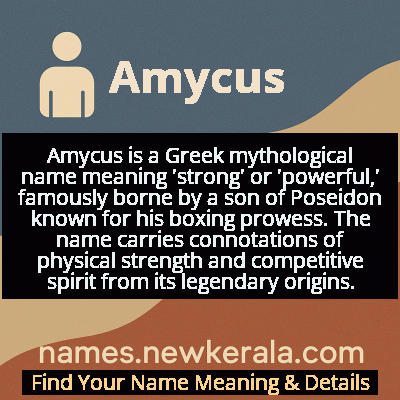Amycus Name Meaning & Details
Origin, Popularity, Numerology Analysis & Name Meaning of Amycus
Discover the origin, meaning, and cultural significance of the name AMYCUS. Delve into its historical roots and explore the lasting impact it has had on communities and traditions.
Name
Amycus
Gender
Male
Origin
Greek
Lucky Number
1
Meaning of the Name - Amycus
Amycus is a Greek mythological name meaning 'strong' or 'powerful,' famously borne by a son of Poseidon known for his boxing prowess. The name carries connotations of physical strength and competitive spirit from its legendary origins.
Amycus - Complete Numerology Analysis
Your Numerology Number
Based on Pythagorean Numerology System
Ruling Planet
Sun
Positive Nature
Leaders, ambitious, highly driven, self-reliant, innovative.
Negative Traits
Overly aggressive, domineering, impatient, selfish.
Lucky Colours
Red, orange, gold.
Lucky Days
Sunday.
Lucky Stones
Ruby, garnet.
Harmony Numbers
2, 3, 9.
Best Suited Professions
Entrepreneurs, managers, engineers.
What People Like About You
Courage, determination, leadership.
Famous People Named Amycus
Amycus of Greek Mythology
Mythological Figure
Legendary boxer and king defeated by Polydeuces in the Argonaut expedition
Amycus (Centaur)
Mythological Creature
Participant in the centauromachy at the wedding of Pirithous
Amycus (Christian Martyr)
Religious Figure
Early Christian martyr venerated in Eastern Orthodox tradition
Name Variations & International Equivalents
Click on blue names to explore their detailed meanings. Gray names with will be available soon.
Cultural & Historical Significance
Beyond the primary myth, Amycus appears in other traditions including as one of the centaurs at the disastrous wedding of Pirithous, further cementing his symbolic role as representing untamed, violent nature that threatens social order. The persistence of his story across multiple classical sources demonstrates how the Greeks used such mythological figures to explore complex ideas about justice, civilization, and human nature. The name continued to appear in later Christian contexts as a martyr, showing how classical names were adapted into new cultural frameworks while retaining some of their original symbolic weight.
Extended Personality Analysis
The name Amycus evokes a personality characterized by formidable physical presence and assertive confidence, reflecting its mythological origins as a son of Poseidon known for his boxing prowess. Individuals with this name are often perceived as natural leaders with strong protective instincts toward their family and domain, mirroring the mythological Amycus's role as a king. They typically possess great determination and competitive spirit, driven to prove themselves in challenging situations. However, the mythological association also suggests potential challenges with temper management and a tendency toward confrontation when their authority is questioned.
On the positive side, the name suggests loyalty, courage, and unwavering commitment to principles, qualities derived from both the divine parentage and the kingly role in mythology. The boxing tradition associated with Amycus indicates someone who respects physical competition and direct confrontation. Modern interpretations might see Amycus as someone who values strength and capability, potentially excelling in sports, leadership positions, or any field requiring determination and physical presence. The negative aspects include possible stubbornness, arrogance, and a propensity to rely on force rather than diplomacy, reflecting the mythological character's fatal flaws that ultimately led to his downfall.
Modern Usage & Popularity
In contemporary naming practices, Amycus remains exceptionally rare and is primarily used by parents with strong interests in classical mythology or those seeking distinctive names with historical depth. The name experienced a minor increase in recognition following the Harry Potter series, where Amycus Carrow appeared as a Death Eater, though this villainous association has likely limited its broader adoption. Current usage is mostly confined to academic families, classical scholars, and mythology enthusiasts, particularly in countries with strong classical education traditions like Greece and Italy. The name's extreme rarity makes it a bold choice that immediately signals classical education or particular literary interests, and it appears more frequently in middle name positions or as a distinctive first name in families valuing unique classical references over popular naming trends.
Symbolic & Spiritual Meanings
Symbolically, Amycus represents the complex interplay between raw natural power and civilized restraint, embodying the eternal struggle between brute force and disciplined skill. The name carries the metaphorical weight of hubris and its consequences, serving as a cautionary symbol about the dangers of excessive pride and the misuse of strength. In its positive aspects, Amycus symbolizes protective power, familial loyalty, and the formidable presence of natural forces, reflecting his divine heritage as Poseidon's son. The boxing narrative makes the name a symbol of challenges that test character and ultimately lead to personal growth through adversity. Amycus also represents the untamed aspects of nature that must be mastered and channeled productively, making it a powerful metaphor for the human journey toward balancing innate capabilities with moral and social responsibility.

